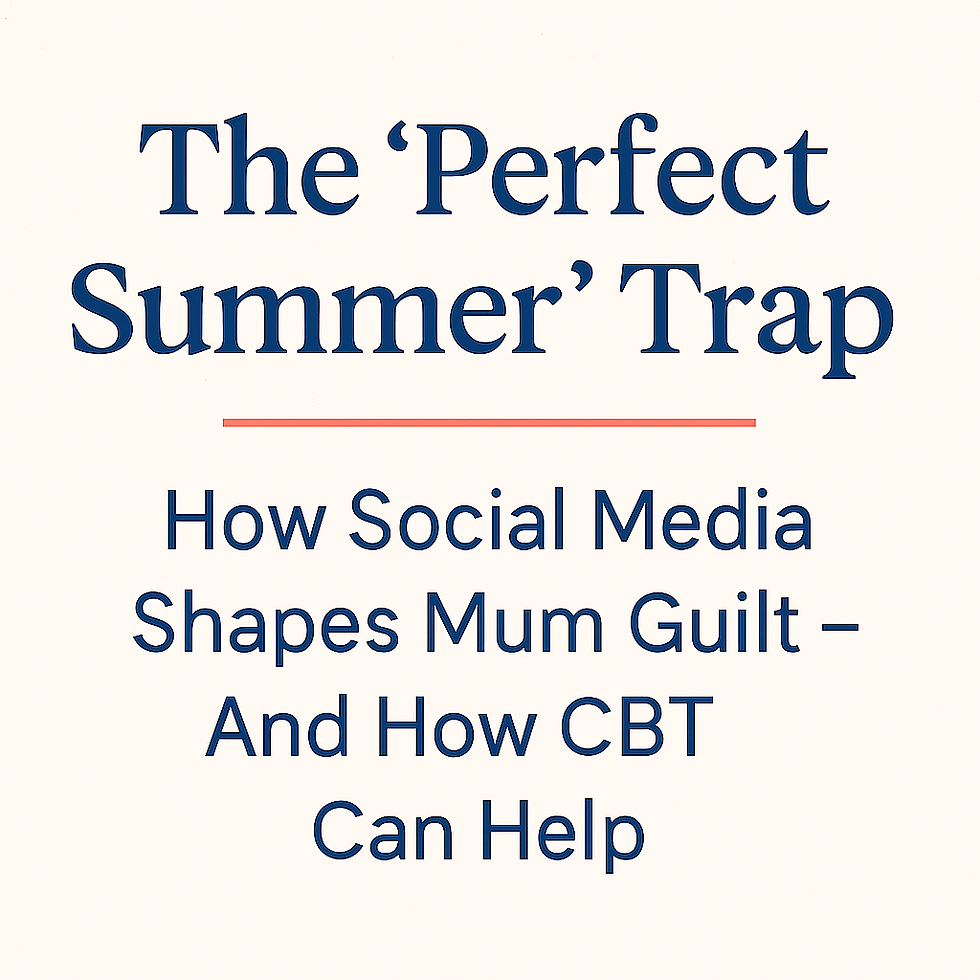The “Perfect Summer” Trap: How Social Influence Shapes Mum Guilt and How CBT Can Help
- cbtbournemouth
- Aug 8, 2025
- 2 min read

By Rebecca, Cognitive Behavioural Therapist cbtbournemouth.com rebeccacoxcbt.co.uk
You scroll through your feed and see it: picture perfect family picnics, smiling children on exotic holidays, colour coordinated outfits and craft days. Everyone else seems to be having the perfect summer… and suddenly your own day, spent juggling snacks, work emails, and sibling squabbles, feels like a failure.
This is the “Perfect Summer” trap and it’s one of the biggest drivers of mum guilt during the school holidays. But it’s not the full story. Let’s unpack the psychology, the research, and the CBT tools that can help you step off the comparison treadmill.
How Social Media Fuels Mum Guilt
1. Social Comparison Theory in Action: Psychological research shows we compare ourselves to others to evaluate our own performance and worth. On social media, those “others” are often carefully curated, filtered versions of reality and the comparison is inherently biased and unfair.
2. Highlight Reels, Not Reality: Parents rarely post meltdowns in the supermarket queue or the 3rd day in a row of pasta for dinner. When we compare our unfiltered life to someone’s highlight reel, guilt and inadequacy naturally rise.
3. Algorithmic Amplification: Social media platforms are designed to show you more of what you engage with. That means if you click on a few “summer activities” posts, your feed quickly fills with even more elaborate, staged family moments creating a distorted perception of what’s “normal.”
The CBT Perspective
CBT (Cognitive Behavioural Therapy) helps us see how thoughts, feelings, and behaviours interact. In the “Perfect Summer” trap, the cycle often looks like this:
Trigger: Scrolling past a perfect family beach trip photo.
Thought: “I’m not doing enough for my kids, I'm not making enough memories.”
Feeling: Guilt, anxiety, sadness, defeated.
Behaviour: Scroll more more ideas, over planning activities, overspending, or avoiding social media entirely but still thinking about it.
Research from UK-based CBT programmes shows that structured CBT interventions can reduce rumination and self-criticism both common in mum guilt.
4 CBT Tools to Break the Cycle:
1. Thought Labelling: Notice and label the thinking error. Example: “This is a comparison thought based on someone’s highlight reel.”
2. Reality Testing: Ask: “What’s the whole picture here? Could this be a staged moment?” Remember, even the most photogenic families have off days.
3. Values-Based Planning: Plan summer activities based on your family’s values (connection, fun, rest) not internet trends or what it feels you should be doing. Behavioural activation research shows value-driven activities boost mood more than pressure-driven ones.
4. Social Media Boundaries: Set a specific “scroll window” each day. UK studies on digital wellbeing show reduced screen time can lower anxiety and improve self-esteem.
Why Private CBT Might Help You Faster
Tailored strategies: Sessions focus on your unique triggers and pressures.
Flexible scheduling: Perfect for fitting around school holidays.
Evidence-based: BABCP-accredited CBT therapists work to NICE-recommended standards, proven effective in UK clinical trials.
Final Thought
Your kids don’t need a perfect summer. They need you present, connected, and kind to yourself. By understanding how social media shapes guilt and learning CBT strategies to challenge it, you can swap pressure for presence and enjoy the summer for what it is: imperfect, but real.
To start your CBT journey you can contact me on rebecca@rebeccacoxcbt.co.uk or Book Online



Comments